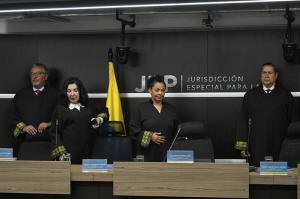Colombia peace court sentences former FARC leaders for their role in
thousands of kidnappings
[September 17, 2025]
By MANUEL RUEDA
BOGOTA, Colombia (AP) — Colombia’s peace tribunal on Tuesday issued its
first sentence on war crimes committed during decades of internal
conflict, finding seven former leaders of the Revolutionary Armed Forces
of Colombia, FARC, guilty of imposing policies that led to the
kidnapping of 21,000 people.
The court said that the rebel group kidnapped civilians for ransom to
finance its operations, while also depriving soldiers and politicians of
their liberty in hopes of exchanging them for imprisoned rebels.
For the next eight years, the former rebel leaders must work on projects
to find the bodies of missing people and remove landmines from rural
areas. They will also have to engage in symbolic acts of reparation with
their victims. To ensure compliance, the seven leaders will follow a
strict schedule and have their movements monitored with electronic
devices.
“This sentence does not erase the suffering of the victims,” said Camilo
Suárez, the lead judge in the case. “But it is the voice that recognizes
that what they went through was unjustifiable and inhumane.”
The court known as the Special Jurisdiction for Peace was created as
part of the 2016 peace deal between the Colombian government and the
FARC rebels. It has been praised by legal scholars who have argued that
the tribunal has helped to document and uncover the grisly details of
Colombia’s civil war. But it has also been criticized by Colombians who
would like to see harsher punishments for perpetrators of war crimes.

Sebastián Velásquez, a spokesman for the Federation of Victims of
Terrorism in Colombia, which represents more than 1,200 victims of
Colombia's conflict, said he was disappointed with the ruling, because
it did not force the former rebel leadership to provide economic
compensation to communities affected by kidnappings.
The victims' group contends that during Colombia's conflict the FARC
leadership amassed money in bank accounts and purchased homes, farms and
cattle that were transferred to third parties, and could be sold to
compensate victims — a claim denied by the former FARC leadership.
[to top of second column]
|

Members of Colombia's peace tribunal arrive to read a guilty
sentence for war crimes by former leaders of the Revolutionary Armed
Forces of Colombia, FARC, in Bogota, Colombia, Tuesday, Sept. 16,
2025. (AP Photo/Fernando Vergara)

“They avoided going to prison, in exchange for telling the truth,”
Velásquez said. “In our opinion they have not fully complied with
that deal.”
Those who are summoned by the tribunal, accept its charges and
collaborate with its investigations, are generally spared from
prison time and are instead required to work on projects that
include efforts to provide reparations to the victims of Colombia’s
armed conflict.
Suspects who do not accept the peace tribunal’s charges but are
found guilty of war crimes can face lengthy prison sentences.
In the early days of the kidnapping investigation, the FARC’s former
secretariat accepted charges that its policies led to the
kidnappings of 21,000 people, with its seven members attending
several hearings where they were questioned by judges and victims.
During its investigation, the tribunal found that many victims were
kept in chains or cages by the rebels, and that there were cases of
sexual abuse. The rebel leaders who were on trial today, also
acknowledged that they failed to control the conduct of fighters
under their command.
Later this week, the peace tribunal is expected to rule on a second
case involving extrajudicial executions committed by Colombia’s
military.
All contents © copyright 2025 Associated Press. All rights reserved
 |